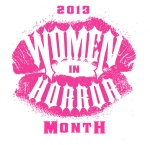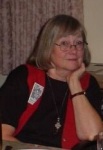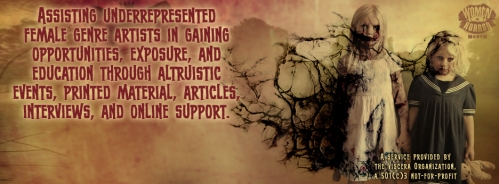While the month of February is nearly done and therefore Women in Horror Month, women writing horror shall never end. We are enduring, and so is Eileen Kernaghan a long-time and award winning author of speculative fiction and poetry. She has published dark fantasy and horror-themed poetry in a variety of magazines and anthologies, including On Spec, Dreams & Nightmares, Weird Tales, Black Lotus, Tesseracts 6 and TransVersions. Some of her darker short stories have appeared in The Year’s Best Fantasy & Horror, On Spec, TransVersions, Ark of Ice: Canadian Futurefiction and Northern Stars. “Carpe Diem,” which looked at the possible future of Canadian medical care, has been reprinted several times, and won an Aurora Award. It was also made into a short subject film by an Alberta filmmaker.
Tales from the Holograph Woods, a thirty year retrospective of her speculative poetry, was published by Wattle & Daub Books in 2009. “Many of the poems are dark, though more skin-crawly than blood-splattered. Recently I’ve gathered together my published SF/F stories in a collection, Dragon-Rain and Other Stories, and I’m about to send it out into the world as an e-book. As I read back over the manuscript, I’m surprised to see how dark some of those stories are. Even the lead story, meant to be humorous, deals with some pretty unpleasant stuff.”
EILEEN KERNAGHAN
1. Why do you write dark fiction/horror? Some people consider it only a sensationalistic tableau. Why this genre over others or do you span the literary landscape?
Tales from the Holograph Woods, published by Wattle and Daub Books.
I’ve published historical fantasies, ( both YA and adult), sword & sorcery, non-fiction, a re-envisioned fairytale, even a mystery story, so yes, I’ve experimented with various genres. For some reason (no doubt deeply psychological) I take a special satisfaction in writing a story that will creep people out.
2. What dark themes do you explore in your fiction?
The darkness in my stories is generally the kind of thing that haunts everyone subconscious — childhood terrors, adult anxieties, the horrors that the future could bring. As in my poetry, I leave the visible blood and guts to other writers.
Dragon Rain and Other Stories is a collection of Eileen’s stories.
3. Do you feel horror/dark fiction is an important genre and why; what does it bring to the table or allow you to explore? Who inspired you?
It’s important, and enduring. While dark fantasy and horror will always be popular as entertainment, the best of the genre has survived for centuries as part of our literary heritage. I grew up on Tales from the Crypt, Weird Tales, H.P. Lovecraft and, on the more literary side of things, Bram Stoker and Mary Shelley. But it was Shirley Jackson who showed me that the worst horrors lurk just out of sight.
What does dark fantasy allow me to explore? The best answer I know comes from Alberto Manguel, in his forward to Black Water: The Book of Fantastic Literature: “…it deals with the invisible, the unspoken; it will not shrink from the uncanny, the absurd, the impossible; in short, it has the courage of total freedom.”
4. Do you feel women are under-represented in any way in the speculative arena or do you think there is more focus on them than on men? (or examples of how there is a balance)
When I first read this question, I thought that yes, by now, women must be equally represented in SF/F/H. But I was making comparisons to my early days as a writer, when there were only a handful of women in the field; and to a period somewhere in the eighties when male sword and sorcery authors were heard to whinge that the editors, the writers and the heroes were all female. However, reading the responses from younger writers more aware of the current situation, I’m just going to admit that I have no idea.
Transversions was a Canadian publication and featured various speculative fiction stories.
5. Abuse against women is worldwide: the gang rape of the Indian woman, women assaulted in various terrorist attacks or protests against regimes (Egypt, Syria, etc. throughout time), domestic violence and murder at the hands of boyfriends, fathers, families and husbands, sexist representation, being treated as second class citizens or possessions and made to dress in a particular way, etc. With all that’s going on, what do you want to say about where women are or what we can do to stem the tide?
On a personal level, we can teach our sons and grandsons to respect women, and just as importantly, teach our daughters and granddaughters to respect themselves. (When I watch “Girls,” clever and entertaining as the show is, I wonder how far we’ve come in that regard.) But in terms of the worldwide rape, murder and abuse of women, I can only watch with despair. We can’t speak for the women who suffer those horrors–-we have no concept of what it must be to live their lives.We can only hope that they keep finding the courage to speak and to act for themselves.
Website: www.eileenkernaghan.ca
Blog: http://eileen-kernaghan.blogspot.com




Great to see this interview of one of our ablest and most elegant writers of speculative fiction. Any way to fix the links so we can see the covers of her books above?